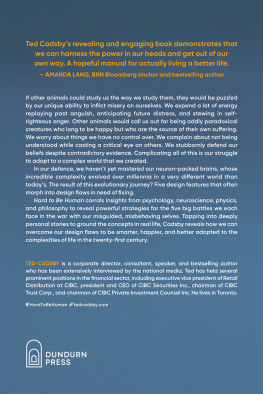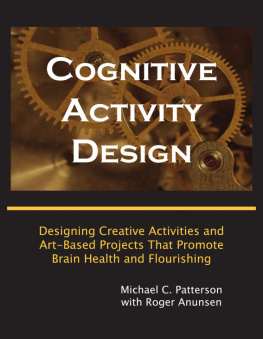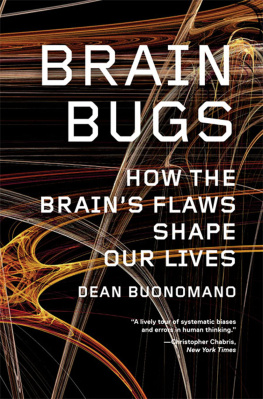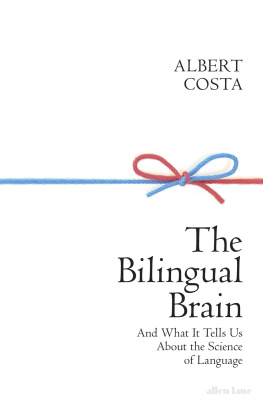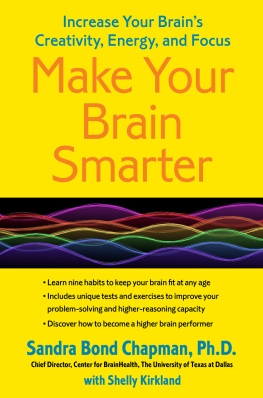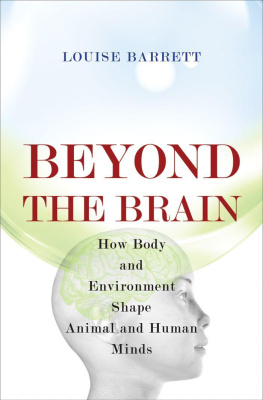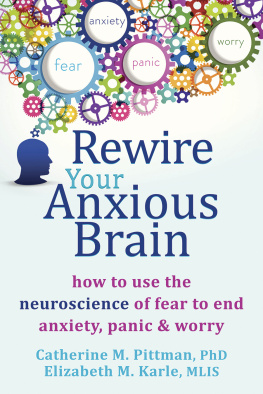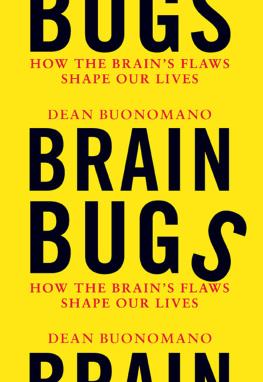Contents
Guide
hard to be human
hard to be human
Overcoming Our 5 Cognitive Design Flaws
TED CADSBY

Copyright Ted Cadsby, 2021
All rights reserved. No part of this publication may be reproduced, stored in a retrieval system, or transmitted in any form or by any means, electronic, mechanical, photocopying, recording, or otherwise (except for brief passages for purpose of review) without the prior permission of Dundurn Press. Permission to photocopy should be requested from Access Copyright.
Publisher and acquiring editor: Scott Fraser | Editor: Cy Strom
Cover designer: Laura Boyle | Interior designer: Karen Alexiou
Printer: Marquis Book Printing Inc.
Library and Archives Canada Cataloguing in Publication
Title: Hard to be human : overcoming our five cognitive design flaws / Ted Cadsby.
Names: Cadsby, Ted, author.
Description: Includes bibliographical references and index.
Identifiers: Canadiana (print) 2021022195X | Canadiana (ebook) 20210222557 | ISBN 9781459748842 (softcover) | ISBN 9781459748859 (PDF) | ISBN 9781459748866 (EPUB)
Subjects: LCSH: Cognitive psychologyPopular works. | LCSH: CognitionPopular works. | LCSH: BrainPopular works. | LCSH: Thought and thinking.
Classification: LCC BF201 .C33 2021 | DDC 153dc23

We acknowledge the support of the Canada Council for the Arts and the Ontario Arts Council for our publishing program. We also acknowledge the financial support of the Government of Ontario, through the Ontario Book Publishing Tax Credit and Ontario Creates, and the Government of Canada.
Care has been taken to trace the ownership of copyright material used in this book. The author and the publisher welcome any information enabling them to rectify any references or credits in subsequent editions.
The publisher is not responsible for websites or their content unless they are owned by the publisher.
Dundurn Press
1382 Queen Street East
Toronto, Ontario, Canada M4L 1C9
dundurn.com, @dundurnpress 
To J & M
Ive got your backs, always.
CONTENTS
INTRODUCTION
Other Animals Have It Easier
Y ou and I are freaks of nature: the only surviving species in the most complex genus of the primate order in the mammalian class of animals. We Homo sapiens are a seven-million-year-old hominin experiment that actually began four billion years ago when the first living cells embarked on a trial-and-error path that dead-ended for our Neanderthal cousins and many other human species. We bumbled our way through various obstacle courses that the other humans failed to navigate, and here we are: rudimentary animals with an added layer of mental complexity, off-the-rack primates with souped-up brains. Although, in fairness, souped-up doesnt do our grey matter justice.
An elephants brain is three times as large and has three times as many neurons (257 billion versus our 86 billion). But most of its neurons are crammed into its cerebellum, which navigates its huge body and hardworking trunk, leaving a small portion of neurons for its cerebral cortex the seat of high-level thinking. We, on the other hand, have three times as many cerebral neurons (some of which make up our unusually large prefrontal cortex the seat of super high-level thinking). No other animal has anywhere close to our cerebral neuronal density, which is the basis of our remarkable cognitive complexity, including the unique form of human consciousness.
As impressive as it is, this cerebral complexity also underlies the human predicament. Tortured by our own minds like no other animal, we expend a lot of mental energy reliving past anguish, anticipating future distress, stewing in self-righteous anger, and reacting to triggers that are products of our overactive imaginations.
If other animals could study us the way we study them, they would be puzzled by our unique ability to inflict misery on ourselves. They would call us out for what we are: oddly paradoxical creatures who long to be happy while creating our own suffering in the form of anxiety, fury, depression, self-pity, and even self-loathing. We worry about things we have no control over. We aspire to goals we lack the discipline to achieve. We whine about not being understood while casting a critical eye on others. We stubbornly defend our entrenched opinions despite ambiguous if not contradictory evidence. Complicating all of this is our struggle to adapt to a complex world that we ourselves created. The paradoxes of being human are stacked high.
While they dont know it, other animals have it easier.
Comparing humans and other animals, the philosopher Arthur Schopenhauer had an interesting perspective on who suffers more. In his 1851 essay On the Suffering of the World, he argues that there is no contest:
Boredom is a form of suffering unknown to brutes whereas in the case of man it has become a downright scourge.
Human needs are much more difficult to satisfy than those of the brute because the brute is much more content with mere existence than man.
Brutes show real wisdom when compared with us their quiet, placid enjoyment of the present moment puts us to shame for the many times we allow our thoughts to make us restless and discontented.
Evil presses upon the brute only with its own intrinsic weight; whereas with us the fear of its coming often makes its burden ten times more grievous.
Schopenhauer points out that only humans are haunted by the spectre of their own death. Ultimately, need and boredom are the two poles of human life and suffering in human life [is] out of all proportion to its pleasures. He concludes that we should actually envy other animals, because the human life is characterized by misery where each of us pays the penalty of existence in his own peculiar way but misfortune in general is the rule. He suggests that we humans should address one another as my fellow sufferer.
Lest you are tempted to dismiss Schopenhauer as comically extreme, he reminds us that most ancient Indian and Greek mythologies put human misery at the centre of their stories, as does the Christian doctrine that we come into the world with the burden of sin upon us having to continually atone for this sin. I would add that the seeming serenity of Buddhism starts from the premise that life is interminable suffering. And that suicide appears to be a unique human affliction: while other animals can inflict harm on themselves and respond to trauma with self-neglect, they do not demonstrate an intent to kill themselves. As science writer Jesse Bering puts it in his book Suicidal, On no occasion has a distraught or ostracized ape ever been seen to climb to the highest branch it could find and jump. Thats us. Were the ape that jumps. In fact, research indicates that at least 40 percent of us contemplate suicide at some point in our lives, and fully half of that group formulate plans to carry it out.
Whats Our Problem?
I like the way author Nassim Nicholas Taleb captures our predicament: Our minds are like inmates, captive to our biology, unless we manage a cunning escape. (Remember these last six words because Ill come back to them.) In fact, our minds have minds of their own. Of the many human paradoxes, this is the central one and the primary source of our unique struggle: we are captive to ourselves. Our well-being depends on a three-pound, electrical meat machine with a long, circuitous history of development that yielded some amazing features but also some troublesome glitches not bugs per se, since the flaws are embedded in the features themselves.

